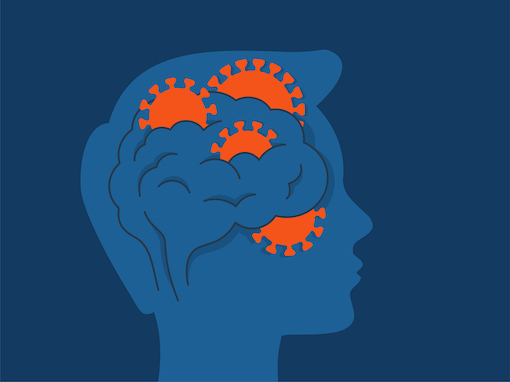COVID Brain – Understanding the Effects of COVID Fog on Mental Health

COVID-19 changed our entire society seemingly overnight, resulting in a collective trauma psychologists believe will span for generations. Some call it COVID Brain.
Blind optimism made us think government mandates would be lifted by June, and the little information we had about this unknown virus convinced us it was just the flu. With over 115 million cases and 2.5 million deaths worldwide, it’s clear now that we were wrong.
What does this “new normal” mean for everyone’s mental health? 79% of teens reported feeling isolated, while 56% of young adults reported feeling both anxiety and depression since April 2020. School closures, job losses, and feeling like they are missing out on important life events are some of the biggest stressors. Now that we know more information about the long term effects of the virus, their concern for their physical health is now piling on the stress.
Since COVID-19 is a respiratory borne virus, patients should expect issues with cough, shortness of breath, sore throat and congestion. People diagnosed with COVID-19 often report a wide variety of symptoms from mild to severe that may include:
- Fever or chills
- Cough
- Shortness of breath or difficulty breathing
- Fatigue
- Muscle or body aches
- Headache
- New loss of taste or smell
- Sore throat
- Congestion or runny nose
- Nausea or vomiting
- Diarrhea
- Light sensitivity
Several preliminary studies of COVID-19 have shown that this virus is neuro-invasive. Simply defined, this virus can invade the brain and nearby nerves causing issues like the loss of smell and taste. Other specific neurological symptoms seen include muscle weakness, tingling or numbness in extremities, dizziness, confusion, delirium, seizures, and stroke.
Clinically known as dysexecutive syndrome, the condition is a COVID-19 fueled delirium. This is initially experienced by mostly older patients while sick, manifests as a state of confusion and impaired awareness. This “fog” then often lingers after recovery to torment as relentless cognitive fatigue.
Published in a February 12, 2021 JAMA article, Dr. David W Nauen and other pathologists at Johns Hopkins Medicine in Baltimore, and Brigham & Women’s Hospital in Boston, have found evidence that large bone marrow cells known as megakaryocytes may be responsible for the brain fog.
Nauen suggests that megakaryocytes migrate to the brain in an advanced journey incited by the destructive activity of the virus that causes COVID-19, SARS-CoV-2.The out-of-place cells then reduce or completely block the flow of blood through individual capillaries in the cerebral cortex, the area of the brain where most information processing occurs, leading to neurological impairment.
The brain is a complex organ and no one is quite sure what causes COVID Fog. Many people who have recovered from COVID-19 have reported feeling not “normal.” They reported experiencing short-term memory loss, along with confusion and with a decreased ability to concentrate on normal daily everyday activities. Symptoms commonly include:
- Forgetfulness
- Cognitive decline
- Fuzzy thinking
- Feeling tired
- Haziness
- Poor concentration
- Memory problems
- Inability to focus
- Difficulty in problem solving
Several potential underlying causes to the viral effects may include stress, diet, lack of sleep, a plethora of medications, chronic fatigue, menopause, medical conditions, and heavy metal exposure.
As a mental health treatment provider, we also recognize brain fog can manifest as a symptom of a mental health issue like depression or ADHD. Mental health professionals can use a battery of therapeutic approaches like Cognitive Behavioral Therapy to treat difficulties in cognitive thinking, the psychological impacts of isolation, and other underlying psychological illnesses.
Cognitive Behavioral Therapy, more commonly referred to as CBT, is a type of psychotherapeutic treatment created to help people learn how to recognize and change destructive or disturbing actions by identifying the thought patterns that have a negative influence on their behavior and emotions.
These spontaneous negative thoughts have a detrimental influence on mood, contributing to and worsening emotional difficulties, like depression and anxiety. Cognitive Behavioral Therapy focuses on giving you the tools to change your thought patterns and learn to live a healthy and productive life.
Trauma-Focused CBT focuses on reducing both emotional and behavioral symptoms resulting from traumatic events. TF-CBT has been shown to decrease posttraumatic stress symptoms that may result from abuse-related fears, depression, shame, sexualized behavior, along with continuous traumatic stress, and the anxiety of living with a realistic threat of continued danger.
As we approach the one year anniversary of the arrival of COVID-19 in America, it’s important to reflect on what we’ve learned about the effects it has on us, both physically and mentally.
If you need support, Waterford Counseling is here to help you. Call 855-203-7240 to book your free assessment with us today.

Everything is very open with a really clear description of the issues. It was really informative. Your site is extremely helpful. Thank you for sharing!